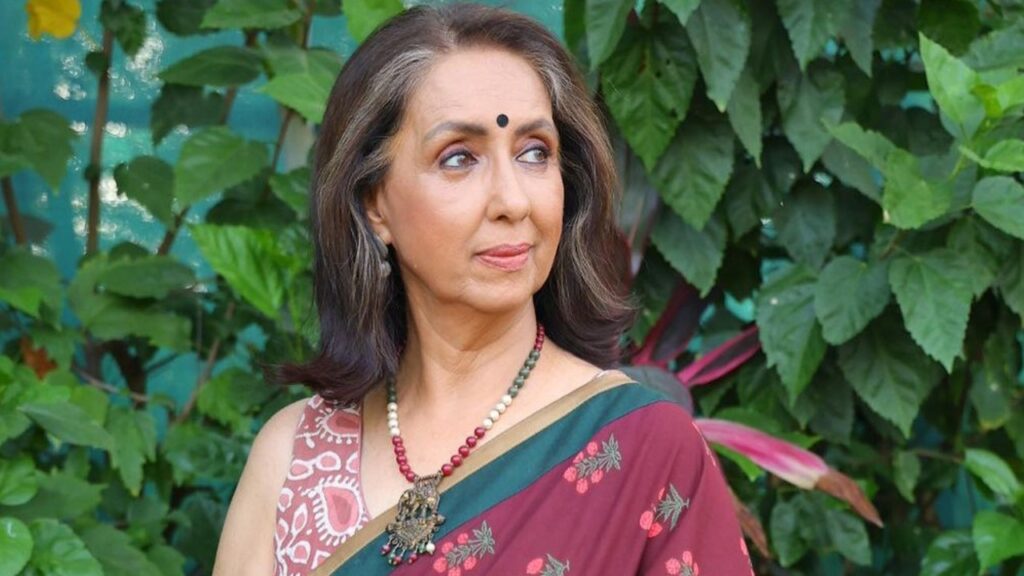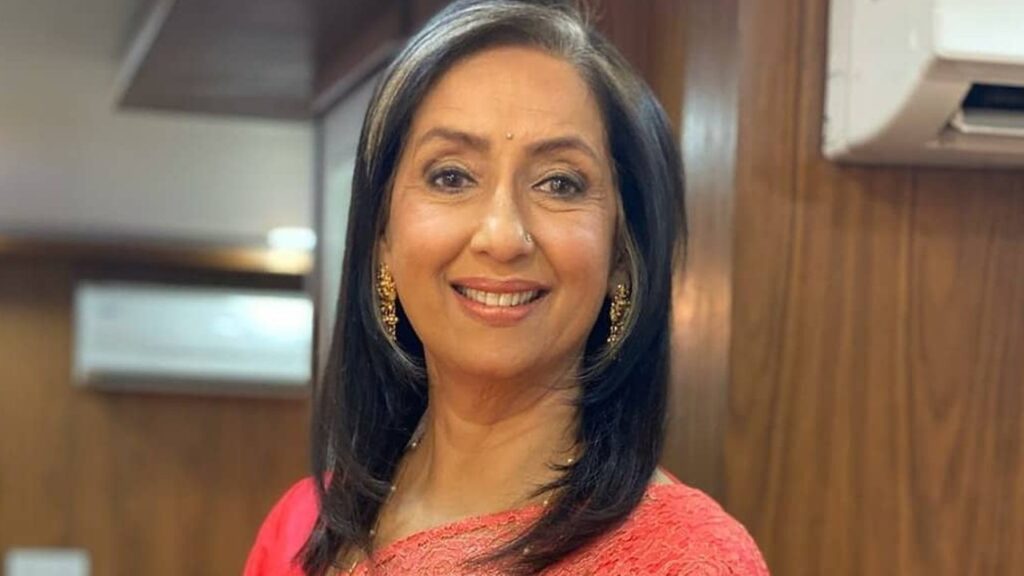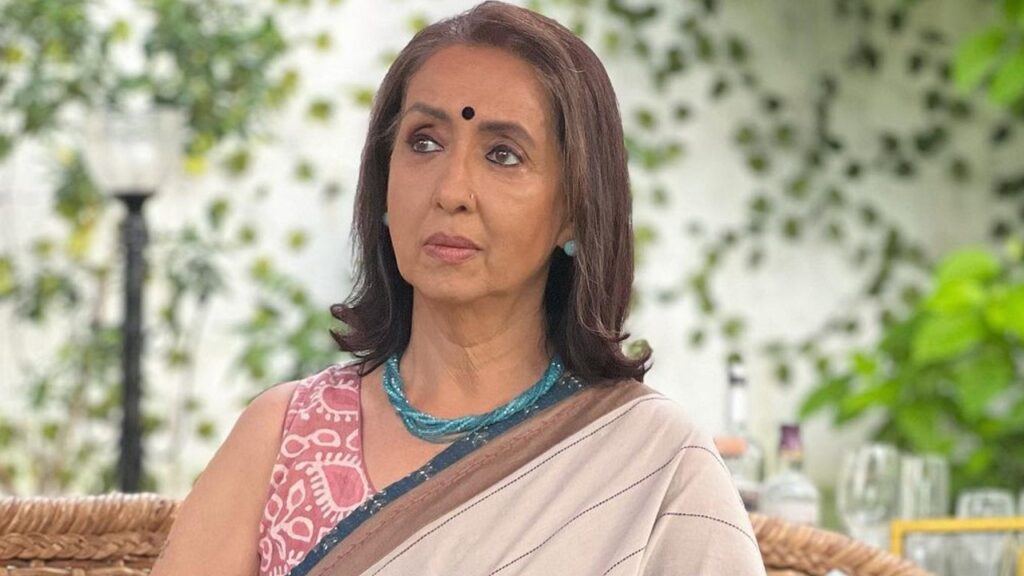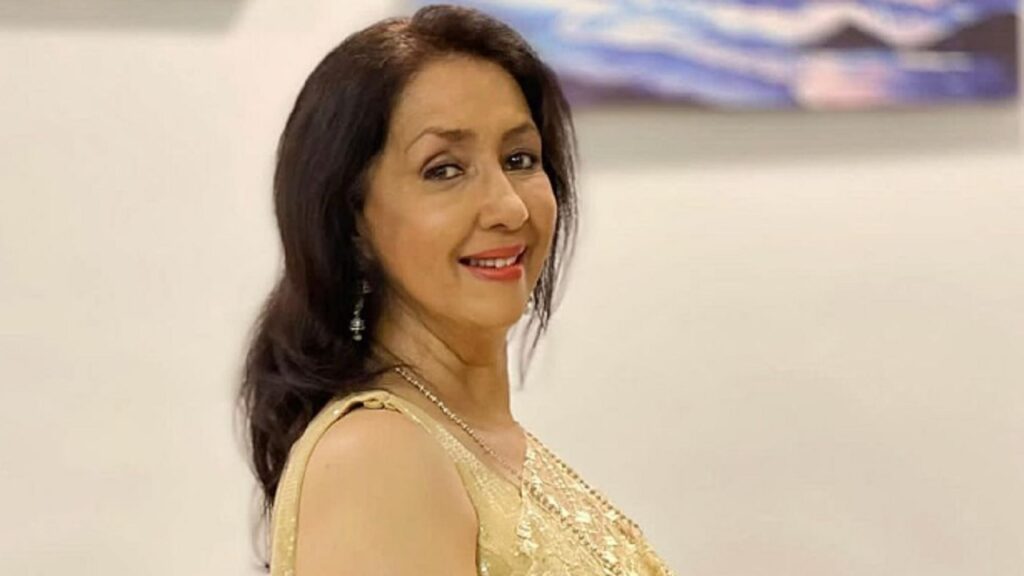In an exclusive conversation with Cutting Shots, veteran actress Neena Kulkarni opens up on her latest release Shastry Viruddh Shastry, breaks down her acting process, talks about why television is a demanding medium and even doles out some advice for young actors.

“I don’t think I will ever quit this acting journey because there is no destination for me. I don’t want to reach somewhere,” Neena Kulkarni candidly tells me as she reflects upon her more than four decades long journey as an actor across different languages and mediums. The excitement in her voice and her love for her craft is palpable.
Excerpts from our exclusive interview with the veteran actress whose latest film Shastry Viruddh Shastry hits the the marquee today-
Q. Firstly, congratulations! Your Marathi film Godavari won the National Award for Best Director (Nikhil Mahajan) this year. Was that win anticipated from your end during the making of the film?
A. No, not while making the film. But we knew that we were making something amazing. Firstly, the film was being made during COVID times. So, we were all huddled up in Nashik opposite Godavari (river). That was a different feeling. If you watch the film, you will know how poignant it is. I knew he (Nikhil Mahajan) had to get the award. In fact, were were also expecting the film to get it. But, I am very happy that Nikhil got it because that’s all his hard work over there.
Q. Coming to Shastry Viruddh Shastry, personally, I connect with the theme of the film because I have spent a lot of time with my grandparents while growing up. I also believe that the film is relevant in today’s times when the structure of joint families is slowly collapsing especially in urban areas. What was it about this film that you found the most relatable?
A. See, I don’t have a grand child. It was a new premise for me which I loved to explore. My other sister’s grandchildren are like my grandchildren. So, the thing is that I feel they actually bring up the child. They are so attached to them because it’s like second parenthood. Whatever they may not have been able to give to their children because of youth and busy lives, they try to give it to their grandchildren and their upbringing. I think that’s what these two people (the characters in Shastry Viruddh Shastry) are doing- best of education, music and art lesson, making a holistic kind of approach towards the child’s progress. I thought that was very wonderful.
I knew about Poshto (the original Bengali film on which Shastry Viruddh Shastry is based). So, when it was offered to me, there was no question of not doing it. And when it comes to Hindi cinema, I always see who is directing the film. So, for this kind of a film, when I came to know that Viacom 18 is producing it and people like Nandita Roy and Shiboprasad Mukherjee are directing it, for me, it was a platter. I wouldn’t say no to it.
I was being offered the main role. Plus, I am very comfortable with Paresh Rawal with whom I have worked in a couple of films. So, there was no reason for me to hesitate. We had a couple of readings. It was wonderful. The film was shot in a start-to-finish schedule in Panchgani. That was nice because you know, then you are there throughout. These kind of films can’t be made in bits and pieces. It was a start to finish thing where you are in the role. Every day, you can give something more to your role to make it more wholesome.

Q. You have always emphasised that the medium is a decisive factor for you when it comes to taking up new projects. For example, when it’s theatre, you look at the script, director and a team with whom you can get along with while performing live. On the other hand, when it’s cinema, your focus is more on working with interesting directors. Talking about Nandita Roy and Shiboprasad Mukherjee, what made them different from all the other filmmakers with whom you have worked so far?
A. I love Bengali cinema. I always watched them and have done my best in Shastry Viruddh Viruddh. People like Soumitra Chatterjee were associated with Poshto. They (Nandita and Shiboprasad) made films on senior citizens and their problems. Their other two films are also doing so well. I think they tackled these kind of mature subjects very well. I didn’t know them personally though before working with them.
I have worked with duos before like Sumitra Bhave and Sunil Sukthankar. I did Marathi films with them. So, I wasn’t hesitant about working with a director-duo because I knew that they offer the best together. Both, Nandita and Shiboprasad were wonderful. There was no question about the fact that they knew what they wanted. That’s why I always say that when it comes to films, I always look at the director first. The director has to be capable.
If you see my Hindi filmography, I have only worked with good directors like Mani Ratnam, Shankar, Aziz Mirza, Priyadarshan, to name a few. I recently worked with Sunny Deol In Ghayal Again. So, I have generally taken up films where the director is good. I still feel cinema is a director’s medium. That’s why when Nikhil Mahajan won the National Award, I was like it is a director’s medium.
When Shastry Viruddh Shastry was offered to me, I felt that the story was very beautiful and emotional.
Q. Your impressive work that we see on screen is a result of all the different acting techniques you have learnt from your theatre gurus (Satyadev Dubey, Vijayata Mehta (Bai)), watching work of other artists, collecting acting trivia and reading books. For your character in Shastry Viruddh Shastry, was there anything that you had to unlearn?
A. Every project makes you demand something new out of you. When you are doing something new, you definitely have to unlearn something. So, I always go with a fresh approach. So, the medium matters to me because it’s the bigger canvas. You have to learn to see yourself on that canvas. It also comes with experience. Once you see that there you are in the film, it gets easier to do it.
Like in Shastry Viruddh Shastry, I know my character is the emotional anchor of the whole family. She’s a woman of fewer words. She really nurtures the child. She respects and stands by her husband though she may or may not agree with him. But, she decides that what he says makes sense. She is a multitasker emotional person. So, that makes her a very strong anchor. I think she is the anchor of the film and that’s what I did and strived to do.
Q. You believe that the medium of TV is closer to theatre than films. It gives the actor the freedom to delve inside the character. Do you feel your experience in TV comes into handy when you approach your roles in films?
A. Television can make or break an actor. I believe it’s a very demanding medium. Every day when you go, you may or may not agree with the scenes that are happening there; you just have to learn your lines, go and perform. So, it could break an actor on that level. But what I have tried it to make me do is every time going and being absolutely present to the fact that okay, I am doing a film today or okay, I am doing a Hindi film today. Even the language matters. The pace, bhaav and sur is different. So, you have to be present to what you are seeking into.
I am very particular about something if I am getting into it. I take that time off mentally and be myself. As an actor, I have to give myself that time where I make the shift. In TV what happens is when you are doing that one scene all the time, you have to learn that. An actor has to have a lot of discipline in him. I have realized this over the years. I have learnt to spread myself as an actor across all these mediums. If I had sat at home and cribbed about not getting any Hindi films, I would have been lost as an actor today. But I said, let me try daily soaps, let me go against the stream and try myself out. You have to keep doing that.
Television can either make or break you, especially when it comes to youngsters. I would tell them that don’t allow yourself to be broken by television. Don’t be like ‘yeh toh baaye haath ka khel na‘. No, nothing is baaye haath ka khel (laughs). Every thing is difficult.
I would say use your difficulty. I go into everything with an open mind. I don’t prejudge. Listen to the director. You have to be mindful and be present at that point. You can’t keep doing your own things. See, acting is not in isolation ever, be it if you are doing theatre or ‘ek patra prayog’, you are still not in isolation because you have a whole unit of people helping you get there. Acting is not about being in isolation. It has to be a together project. I look at it that way.

Q. There was a time when it was said that actresses come with a shelf life though, personally, I don’t like that term because you are calling them a commodity. Nevertheless, it was believed that after a certain age, directors and producers didn’t know how to cast them so they would be offered roles of hero’s mother or sister and so forth. And god forbid, if a younger actress played an older character, she would end up getting typecast. But today, look at you, Shefali Shah, Neena Gupta and Ratna Pathak Shah, you are all playing character-driven roles. Do you feel the cinematic landscape is changing for female actors?
A. Yes, definitely. But then, I played a character role at the age of 22. I always called myself with pride a character actor. I may have been the heroine of some of the Marathi films, yes, but then I was never a part of that typical heroine category. Even if I was the main lead of something story-centric, that didn’t mean it was a character-driven. The names you have mentioned are all character actors. That’s why we could go from playing this to that. That’s a wonderful scenario. I think more and more actors are coming there.
See, in this industry, it’s very important where you pitch yourself. If you pitch yourself as a typical heroine then it would be very difficult for you to make the shift because people don’t accept it. I have never been a heroine. I have always been a character actor right from the time I started my career. I have done varied roles. It makes a difference on that level.
If you are pitched as a heroine, I guess the shift becomes a bit difficult…I don’t know..people also don’t accept na. They don’t want to see you old or non-glamorous.
As far as deprived of roles is being concerned, I spread myself across all mediums. Yeh nahin toh woh. If I have nothing and if I am offered a TV show, I take it up. I have to be that portable as an actor. Plus, I have the advantage of knowing multiple languages. You should keep yourself busy that way. I would envy someone like Meryl Streep because of the variety of roles that she has got at her age. I wouldn’t call her a heroine. She is the main lead. Main lead is a different thing from heroine. On that score, yes, we still has a long way to go, but we are slowing moving towards it.
I feel Karan Johar broke some path with Rocky Aur Rani Ki Prem Kahani which was a highly commercial film. He got old romances back. The effort to break the mould is happening now. I admire Vidya Balan. She came as a heroine and broke the mould. There’s Raveena Tandon, Kareena Kapoor Khan and Kajol who are doing well on OTT.
Q. You have an impressive body of work when it comes to Marathi cinema. You have always said that the filmmaking there have always been ahead of times. But, that industry is yet to go pan India in terms of reach and scale, say when compared to a Tamil or a Telugu film industry. What do you think is the reason behind this?
A. I think it’s the economics of the whole thing. There’s no doubt about it. Although I won’t say that the Marathi industry is lacking recognition. It gets that recognition. It’s just that we don’t tom-tom it. It’s unfortunate for us (Marathi film industry) that we happen to co-exist in the same city as the national Hindi film industry. We are a regional film industry which co-exist in the same city as the national film industry.
We have excellent films coming out in Marathi. We don’t have to mull over ourselves that this subject will not do well with the public. Everyone is doing what they want. I must say that there’s some real creativity happening there. The experimentation in Marathi cinema is commendable.
I did Pondicherry which was entirely shot on a Iphone. Not for effect but because Sachin Kundalkar didn’t want too many people crowding over there. So, it became economical viable for him. We don’t have a makeup man or a hairdresser with us. There was no staff. Me, Amruta Khanvilkar and everyone did our own makeup. So, there’s a lot of experimentation happening in Marathi cinema which is very exciting for any actor. On the other hand, you love to do Hindi films because of the grandeur of the whole thing. Like, a Shastry Viruddh Shastry may be an emotional subject but it’s a grand film.
Q. You mentioned a line in one of your interviews which resonated with me a lot. It read, “You have to be a caterpillar to become a butterfly.” What advice would you like to give to the new crop of actors who have a plethora of mediums to choose today?
A. I work with a lot of youth. That’s another high for me because I am still around and love doing that. Besides the work that I get, big or small, I like to work with them because they are so much more sorted than how we were. We dabbled into something and that became our career because we are passionate about it. But these guys come in with an intent to succeed and get to know it. It’s just that they are spoilt for choices. Suddenly, there is an industry coming to recognition of its own so, there’s lots of auditions and this and that.
I don’t think they need any advice. But I feel they need to have some ‘thehraav’ in them. They need to have a little bit more of patience. See. acting is more about being patient. You need to be patient about work coming to you, then when work comes to you, you need to be patient for your shot and then you need to be patient for your film to release (laughs). Otherwise they are fine.
I think the youngsters today are very sorted. I love the fact that they are very driven and that they are technically also very good. We learnt techniques on the job but these guys come with it. They are technically strong which makes it easy for them.

Q. Lastly, a few months ago, you shared a picture from your first photoshoot for a textile brand that you had shot in 1970. A part of your caption read that when you look back on all those years of glamour, you believe more so in destiny. You enjoyed that phase for a while till you found your way into theatre and acting became your lifelong passion. Now, after being in the industry for more than four decades, besides the passion part, what is that one thing that keeps you on your toes and makes you want to face the camera more and more?
A. I have never really analyzed this but I get scared that if I analyse it then it will get lost. I have lived a middle-class life. Most of the people that I am friends with are not actors or from the industry. They keep telling me, “Ain’t you bored? Now, do something else?” I tell them, “Never.” There’s no destination in this journey that one embarks on as an actor. It’s the journey that’s interesting.
I come from an era where they were all older people, stalwarts and gurus I have worked with. Suddenly, I had directors who were my age or younger and today, the directors tell me, “Maine toh apko bachpan mein dekha hain.” When you work with so many people, you just get richer every day. I feel I am getting richer and richer every day. Even when it comes to roles.
A couple of years ago, I played the role of Jijamata on television (Swarajya Janani Jijamata.) She gave me so much then. I had read about her and all her life. But when you actually go and play her there, you are like ‘Wow, man!’ At this age when I get something for myself, it just makes me so much richer and the journey becomes so much more enjoyable.
I mean look at Mr Bachchan (Amitabh Bachchan). At 81, that guy is going gung-go (laughs). I have done two films with him and the admiration I got from him was inspiration. I was like if through his illnesses, if he can still relentless go, why can’t I do that? More than why can’t do that, I should be doing that. What are we doing wallowing sitting here? My knees is aching and my head is aching! He is an inspiration to all. Words fail me as far as he is concerned.
Look at Kajol. She has taken up so much work on OTT. She has made a name for herself over there too. There’s Kareena Kapoor Khan, Vidya Balan, Madhuri Dixit and who isn’t doing that today. So, we can’t really say that there’s no work. If anybody says there’s no work, it’s just that as I said, be patient. I sat at home for almost a year and a half after Shastry Viruddh Shastry was shot. There was no work. But, theek hain aajayega. At some point, it will come. You have to keep trying till you get work. You have to go for auditions, talk to people if they call you, find out whether the role is worth it. Karna toh hai hi.. (laughs).
